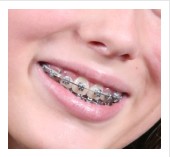Types of Braces
There are various types of braces available to choose from. Read below to find out the various types available today but make sure to talk to one of our orthodontic professional to find out which braces are the right fit for you. Call or make an appointment today for a consultation.

The type of braces you get depends on a number of factors:
- The severity of your condition
- The recommendation of your orthodontist
- How much you are willing to pay
- How long you will be in braces
- Your own personal preference
Ceramic Braces:
Ceramic braces are made of very strong materials and are very similar to metal braces. The brackets are tooth colored and are nearly as strong as metal and can be used to treat nearly all of the same cases.
Ceramic braces are a solution for adults who are looking for orthodontic solutions that blend in with the teeth and aren’t as evident as metal braces. Patients also report less irritation of the gums when compared to metal braces.
The ligatures (tiny rubber bands) that hold the arch wire on to the ceramic brackets are often white or clear. One downside to having ceramic braces is that the ligatures stain over time and can become more noticeable.
Treatment is usually more expensive than metal braces and it can take a bit longer. Schedule a consultation to find out if Ceramic braces are your orthodontic solution.
Invisalign
Is another treatment option for people who seek unobtrusive orthodontic treatment. Instead of brackets bonded to the tooth, dental treatment is mapped out through a series of plastic dental trays designed to move the teeth in incremental movements over weeks. The clear, plastic trays are virtually invisible and are difficult to detect. With Invisalign there is no irritation to the gums and they can be removed for aesthetic reasons over small periods of time.
Invisalign is a solution for patients who are not in need of severe orthodontic treatment and is not a solution for everyone. In some cases, patients may require additional treatment if they have more dental malocclusions. Please schedule a consultation today if you want to find out if you are a candidate for Invisalign.
Metal Braces:
Metal brackets are made of metal brackets along with an elastic rubber band called a ligature to hold the wire onto the bracket. These types of braces are very strong and can withstand most types of treatment. They also tend to be the most inexpensive and can treat the most severe cases. Metal braces also tend to have the least amount of treatment time when compared with other orthodontic solutions.
Some of the drawbacks to having metal braces is that they cause irritation to the cheeks and gum but patients often adjust to the feelings after a few weeks. Metal braces are a solution to nearly all patients who need braces. Schedule an appointment with our orthodontist to find out more about metal braces today.
Self-ligating Braces:
Self-ligating braces are metal braces without the elastic ligature. Using a “trap door” technology, the brackets allow the wire to slide back and forth resulting in fewer adjustments and less appointments. Schedule a consultation to find out if self-ligating braces are right for you.
Lingual Braces:
With Lingual Braces, the brackets are placed behind the teeth and are virtually invisible to others and are most commonly made of metal.
Patients report irritation to the tongue along with an initial adjustment to speaking. Lingual braces may not be for patients in need of severe orthodontic treatment. Schedule a consultation to find out if lingual braces are your orthodontic solution.
If you have any questions about Orthodontic treatment and you live in Dallas or surrounding area, give us a call today!


